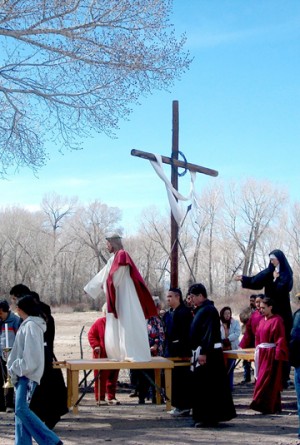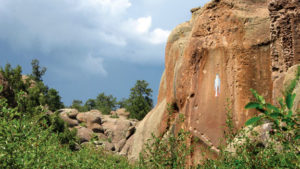by George Sibley
In this year’s “Sonofagunn” show in Gunnison — our annual light “roast” of the Upper Gunnison valley as an Arts Center fundraiser — one of the things we are trying to address is what we consider our local dilemma. The dilemma being no-longer-so-young Western State College graduates, maybe a decade past graduation but still here, underemployed and overworked in the tourist economy. They are looking down the road for a real future. In other words, “I am twenty-some, going on forty,” sung to a vaguely familiar show tune.
The future they are looking for is some variation on the American Dream that is ubiquitous in our cultural environment — some personalized mix of that opportunity, material and psychological security, peer interaction, and the like that is what America is supposed to be all about. Most of the young people trying to make a life here have not been finding much of that in most of Central Colorado. Some do, to be sure, but they seem to be a minority. It’s great to see young people who put up with me in the classroom, starting small businesses in the valley that fill some niche, or landing a “starter spot” with the college, the ski resort, a government agency, or one of local papers that could be an early rung on a career ladder.
For the most part, students who come to a small remote mountain college come for the right reason — looking, however inarticulately, for something beyond the downward homogenizing gravity of the massive mass culture they’ve grown up in, and the mountains convey the illusion of offering that. They get their degrees eventually (a lot of seven-year plans) and try to stay around because they love the challenges and opportunities of the mountains, but gradually come to realize that the future is the price you pay for living this intensely here. Sometime in their late 20s, early 30s, they succumb to the gravity and get pulled back down to the cities of the plains to look for situations that will allow them to apply their educations in meaningful (or at least reasonably reimbursed) work with opportunities for advancement.
We mostly seem to lose young families that way — former free spirits who by fate or destiny get pregnant and realize it’s one thing for two people to pool their tips from dead end resort jobs for a spring trip to Baja, and another to be pooling tips to support a family. The mountain towns have lots of young people and growing numbers of old retirees, but — in this valley at least – school enrollment stays flat even though the population increases. Young families not connected to career paths with the college or government agencies leave. There are certainly exceptions, but not enough to disprove the rule.
Today, however, it’s starting to look like they might as well stay; there are worse places than these mountain valleys to be un- or underemployed, and out in the cities of the plains, at least one working-age person in ten is unemployed; add in the underemployed, and it approaches one in five. One in four teenagers is unemployed because their working parents have those dead end jobs now.
One of the main criticisms being leveled at the Obama administration is that he is not showing strong leadership in “getting people back to work.” But I think it trivializes the problem to believe that any convocation of all the president’s men could put our Humpty Dumpty economy back together again in one year.
And part of the problem might start with the phrase “getting people back to work.” It’s as though it didn’t matter where or what they are working at, just as long as they’re working at something. There is a pervasive sense that we are just in another temporary downturn in the ever-upward trend of American destiny, and pretty soon we’ll get the big juggernaut of American material progress cranked up again and will pick up where we left off. But is that really what we want? Or need? Or can afford?
I’m reminded of something the early 20th-century American philosopher George Santayana said: “Civilization might be taken as a purely descriptive term … rather than a eulogistic one; it might simply indicate the possession of instruments, material and social, for accomplishing all sorts of things, whether those things were worth accomplishing or not.”
So it might be time to ask — was it worth doing, what we civilized Americans were doing when we were so rudely interrupted by recent realities? And weren’t those realities largely a coming-to-roost of consequences from our “instruments, material and social” for doing what we’ve been doing to the planet in Civilization American Style? Should we really be eager to get back to a consumer culture that was pretty literally devouring the life force of the planet?
One of my former Western students sent me his thoughts on that question just a few days ago:
“There is not enough work to do in our depressed economy, so I have been laid off from a construction job. We finished building a 16,000 square-foot home, and no one else wants a mansion right now, so we’re out of work. In order for a general laborer in a construction company to keep his job, people have to continue building houses they don’t need, bigger than they need. Incessant, useless consumption creates jobs. We are creating jobs to keep people employed, all the while avoiding the real work of saving ourselves. What would a real job look like?”
I previously wrote about this student in Colorado Central a year or so ago. He started a “campus garden” at Western — a completely extra-curricular (and originally kind of extra-legal) project that is gradually making its way into the life of the college. Other students have just about doubled its size this past year, and it now has a greenhouse component. A number of faculty are now working with it. The director of Food Services now accepts produce from the garden, and students are going to be able to get “intern” credit for work in it.
Tony — the former student — would not be happy, of course, until Western’s several acres of beautiful bluegrass lawn are also producing vegetables and flowers. He is no longer in the valley. He is now in North Carolina, where he owns a very small farm, and is currently taking advantage of his laid-off leisure to work on an “edible forest” permaculture project with some friends there. He is kind of a Johnny Appleseed, promoting seeding ideas.
Does good gardening sound like a “real job”? I would join him in arguing that growing good food locally (and affordably) is probably more important work than building 16,000 square-foot megamanors. But today it is truly a “will work for food” situation – and will continue to be, if we just “get America back to work” at the same old economy rather than trying to move on to some true 21st-century work. Should communities have a “local food production coordinator,” like we have parks and recreation directors? Someone to provide assistance for new gardeners, oversee the creation and basic maintenance of community gardens, keep the Farmers’ Market going (currently done with serious time investment by a local retired couple), et cetera? As the mid-21st century post-peak-oil energy picture shapes up, this may become a significant aspect of local community survival.
Energy is another area where there should be “real jobs” for the 21st century. I think Colorado’s Governor Ritter is doing a pretty good job of trying to move on to better work for America with his “New Energy Economy” and the Governor’s Energy Office (GEO). A lot of the emphasis is on bringing in “energy industries,” but there’s a lot of attention to local community work too.
In the Upper Gunnison, for example, a volunteer workforce has been working hard to wake up the valley to the economic benefits of serious energy efficiency – not primarily to save the planet from carbon emissions, but to just keep more of our $80 million/year energy dollars at home. The miniscule planetary benefits would be icing on the cake of the “local economic stimulus” that comes, first, from spending at the local hardware store and hiring local contractors for efficiency work, and second, from energy savings down the road.
Most of us working on this process are volunteers, which means that there’s a hit-or-miss quality to the overall effort. But the GEO has now made some of the federal stimulus money available for “energy coordinators” in places like our valley. For the next two years, two people will be making part-time incomes to keep the valley on task for becoming a more intelligent and conscious society. The GEO is not always easy to work with because it is also essentially thrashing around in the underbrush of new frontiers, but it does have a future-oriented vision that is translating into what I would call “real jobs for the 21st century.”
We’re a pretty desperate people today, one in five un- or underemployed, and we’ll probably grasp at any straws that employ warm bodies. But we do need to be trying to think both creatively and critically about whether we will just “go back to work,” or move on to the work we need to be doing.
And we clearly can’t sit around waiting for Congress to try to deal with that … or anything for that matter.
George Sibley was born in Western Pennsylvania, but was conceived in Colorado by Colorado natives, and thus considers himself to be a native Coloradan.

